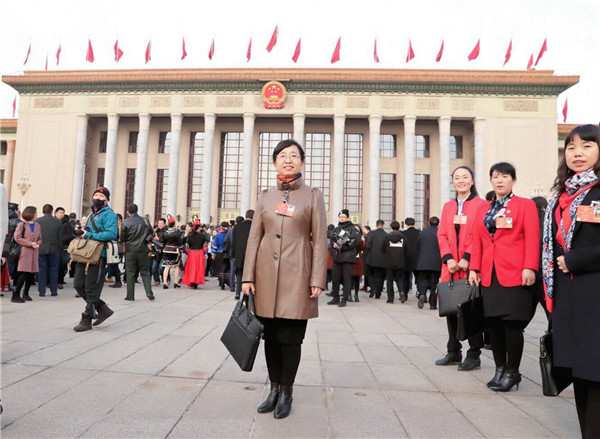Bilingual professionals in demand for TCM: NPC deputy
China.org.cn by Zhang Liying,March 10, 2018 Adjust font size:

Guo Mei, an NPC deputy and a professor from the College of Pharmacy at Gansu University of Chinese Medicine, standing in front of the Great Hall of the People during the first session of the 13th NPC held in Beijing. [Photo courtesy of Guo Mei]
Guo Mei, a professor from the College of Pharmacy at Gansu University of Chinese Medicine, called for more efforts to be made to cultivate bilingual or multilingual Traditional Chinese Medicine (TCM) professionals, during the first session of the 13th National People's Congress (NPC) held in Beijing.
The shortage of bilingual or multilingual professionals is a major barrier to the globalization of TCM, Guo, also a deputy to the 13th NPC, said in an interview with China.org.cn on Wednesday.
Overcoming this barrier became clear to the professor when they were enrolling overseas students and jointly establishing TCM colleges with foreign universities.
The university has enrolled nearly 70 students from countries along the Belt and Road since 2015, as well as setting up eight overseas TCM colleges since 2014 named after Qihuang, a type of Chinese herbal medicine.
"These programs have yielded significant outcomes in spreading TCM, but we are still facing a lack of qualified bilingual or multilingual teachers when pushing ahead with them," Guo said.
She also suggested that efforts should be stepped to advance the overseas registration of Chinese medicine.
"If Chinese medicine is not permitted to be sold in a country, TCM can not be expanded even if its health benefits are recognized there," she said.
As for the domestic development of Chinese pharmaceuticals, Guo applauded the proposal in this year's government work report to "take steps in all sectors to improve quality".
She said the proposal could also be applied to the TCM industry, as higher standards and stricter supervision are needed to ensure the excellent quality of Chinese medicinal products.